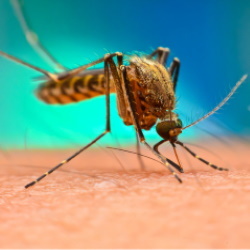Malaria
 |
Every 2 minutes, a child dies of malaria. And each year, more than 200 million new cases of the disease are reported. Although countries have dramatically reduced the total number of malaria cases and deaths since 2000, progress in recent years has stalled. Worryingly, in Southeast Asia, malaria is on the rise as drug resistance is spreading. Malaria is caused by Plasmodium parasites that are spread to people through the bites of infected Anopheles mosquito vectors. Of the 5 parasite species that cause malaria in humans, P. falciparum is the most deadly. Approximately 70% of the world’s malaria burden is concentrated in 11 countries: 10 on the African continent, plus India. Research at Cambridge on Malaria focuses on human-parasite interactions, drug interventions, and the rise of drug resistance, as well as genomics, the evolution of the mosquito vector, and innovative diagnostics technologies. |
Cambridge groups and their work on Malaria
Cicuta Group (Cavendish Laboratory)
Professor of Biological Physics Pietro Cicuta’s research includes studying malaria blood stage infection and pushing the frontiers of single-event infection imaging at the The Cavendish Laboratory, in collaboration with Professor Julian Rayner (CIMR) and Dr Teresa Tiffert and Virgilio Lew of the Department of Physiology, Development and Neuroscience.
Blagborough Group (Department of Pathology)
Andrew Blagborough's group studies disease control strategies that aim to reduce the impact of disease upon the infected individual and reduce the number of new infections at the population level. To do so, they study the viability of approaches using transmission-blocking drugs and transmission-blocking vaccines.
Artavanis-Tsakonas Group (Department of Pathology)
The Artavanis-Tsakonas' group focuses two organisms that establish chronic infections: the malaria parasite, Plasmodium falciparum and the nematodeTrichinella spiralis. They study their mechanisms for avoiding host immune responses, limiting tissue damage, and modulating their immediate surrounding to support their presence. They have a particular interest in how parasites interfere with and manipulate the host ubiquitin-proteasome system.
Merrick Lab (Department of Pathology)
Led by Dr Catherine Merrick, this lab studies the human malaria parasite Plasmodium falciparum, with research centred around DNA biology. The group are currently investigating the antimalarial potential of G-quadruplex binding drugs.
Nisbet Group (Department of Biochemistry)
The Nisbet Group, led by Dr Ellen Nisbet, studies the evolution of Plasmodium falciparum, looking at the transcription of the remnant chloroplast found in the malaria pathogen.
Rayner Group |Human-parasite interactions (Cambridge Institute of Medical Research - CIMR)
Dr Julian Rayner is a malaria researcher who led a group at the Wellcome Trust Sanger Institute, and is now the Director of the Cambridge Institute for Medical Research, part of the University of Cambridge School of Clinical Medicine. His group uses large-scale experimental approaches to identify and prioritise drug and vaccine targets in malaria. Focusing on the blood stages of human malaria parasite species, the group combines systematic genetic modification, proteomics, cellular phenotyping, biochemistry and sequencing to understand basic biology and to advance new therapeutic targets
Lawniczak Group | Vector-parasite interactions (Wellcome Sanger Institute)
The Lawniczak lab is using single cell technologies and whole genome sequencing to study transmission biology. We are carrying out research on questions such as how do parasites find each other to mate inside the mosquito midgut, what factors make a mosquito susceptible to Plasmodium falciparum parasites, and how do mosquitoes evolve in response to our efforts to control them.
Kwiatkowski Group | Natural genetic variation (Wellcome Sanger Institute)
The Kwiatkowski group investigates Plasmodium, Anopheles and human genome variation in large clinical and epidemiological studies carried out with partners in over 20 malaria-endemic countries.
Lee Group | Malaria Parasite Drug Resistance (Wellcome Sanger Institute)
The group aims to understand how malaria parasites become resistant to antimalarial compounds. They study drugs in clinical use as well as those in development, with the goal of mitigating resistance to improve long-term treatment. They test the molecular basis of drug resistance mutations by using state-of-the-art CRISPR-based genome editing in the parasite. This allows the group to pinpoint specific causative mutations, validate new drug targets, and assess the fitness cost associated with the evolution of resistance.
Malaria Research News
Multi-drug resistant malaria spreading in Asia Study reveals importance of ongoing genomic surveillance for malaria control strategies (July 2019, Wellcome Sanger Institute)
Ep. 10 - Cambridge Science Festival (Part 1)- Dr Ellen Nisbet on her Coral Reefs, Malaria and Drug Discovery talk at CSF2019 (March 2019, Department of Biochemistry)
AI 'scientist' finds that toothpaste ingredient may help fight drug-resistant malaria (June 2018, Department of Biochemistry)
A new weapon to fight Malaria (May 2018, Wellcome Sanger Institute)
Malaria Cell Atlas launched: Parasite development mapped in unprecedented detail (March 2018, Wellcome Sanger Institute)
Reducing number of infectious malaria parasites in donated blood could help prevent transmission during transfusion (April 2016, Department of Haematology)
Artificially-intelligent Robot Scientist ‘Eve’ could boost search for new drugs (February 2015, Department of Biochemistry)
Finding malaria's weak spot (February 2013- Department of Physiology, Development and Neuroscience, Cavendish Laboratory and Department of Chemical Engineering and Biotechnology)

